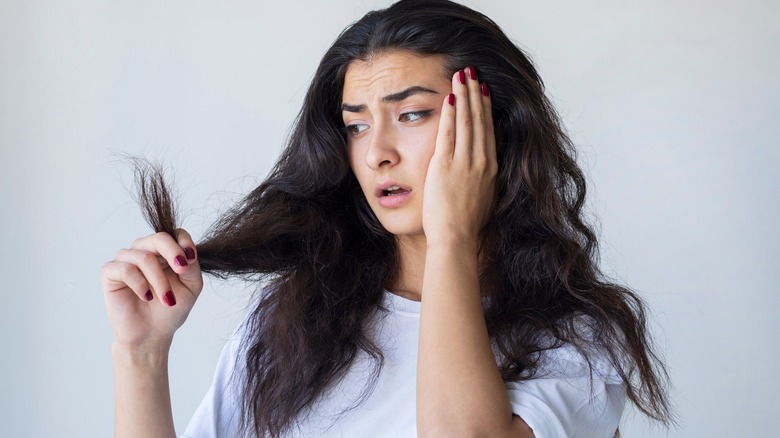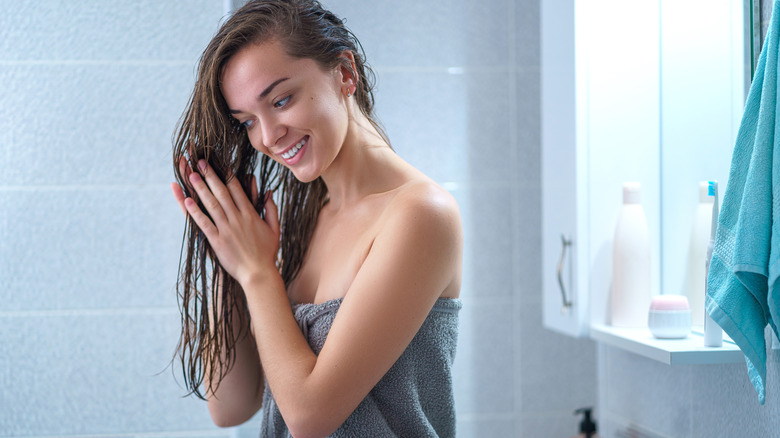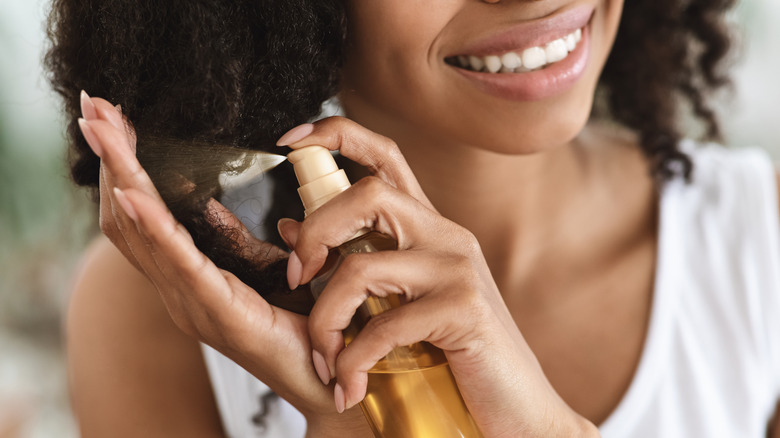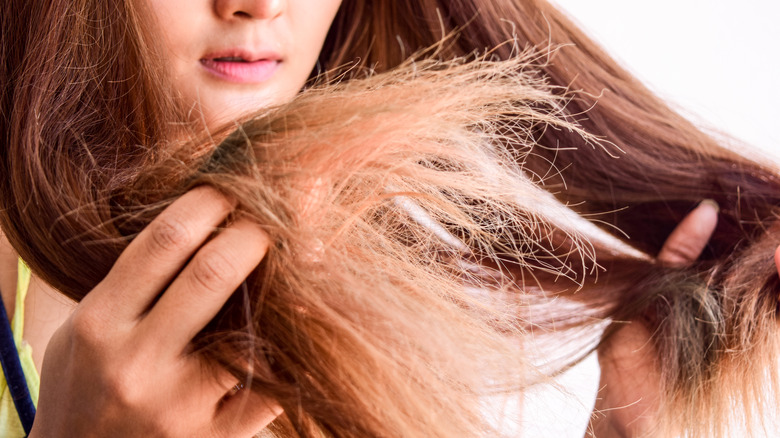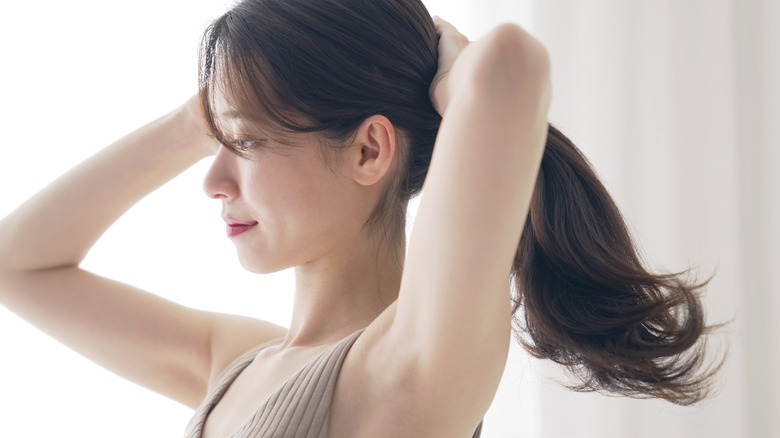Is Too Much Protein In Your Hair A Bad Thing?
You've tested all the latest TikTok hair hacks, and you've copied Kim Kardashian's hair routine to a T. Still, you're left with sad, limp hair. What gives? In your haircare journey, you might have tried a variety of hair treatments and products designed for damaged or dry hair, many of which may have contained protein. Protein-rich formulas are recommended by experts for manes in need of serious TLC, according to Healthline. Those hoping to revive chemically treated or environmentally damaged tresses are especially encouraged to try conditioners and masks loaded with protein.
While protein in haircare products may benefit overworked hair, too much protein may also be damaging your hair without you realizing it. Case in point: Many of the same hair woes that protein helps to fix can be exacerbated by too much protein. Here, we break down the signs of protein overload and how to properly care for your damaged hair.
Protein can make or break your hair (literally)
Protein is a key part of healthy hair — in fact, human hair contains up to 95% protein. Therefore, it makes sense that hair is composed mostly of protein and requires protein-rich products to keep it strong and silky. Along with using the right products for your tresses, eating a healthy, protein-rich diet will also help your hair to look its best, according to WebMD.
Anyone in need of an extra boost of protein can turn to treatment solutions and hair masks. Per MindBodyGreen, these products are usually left on the hair for an extended period of time, allowing the proteins in the masks to strengthen and rebuild hair follicles by working their way deep into damaged tresses. But because hair is already made up of mostly protein, it can only absorb so much. For example, overusing protein-packed hair products will cause protein build-up, which covers and weighs down strands of hair. Stylist warns that this can lead to brittle, flat strands, and eventual breakage. Additionally, those struggling with already damaged hair may notice a rebound effect, where the initial benefits of using protein treatments quickly wear off, leading to tangled, straw-like locks.
Here's how to understand the cause of excessive protein in the hair
It's important to understand that too much hair protein isn't impacted by your morning protein shake or opting for a diet rich in protein. Protein only becomes a problem when it stems from excessive use of hair products that contain protein. If you're worried that your hair might be weighed down by protein, it's certainly okay to keep munching on protein bars, but you may want to step away from the protein hair treatments for a while. Double check the instructions on your at-home hair care products to ensure you're not using them more often than recommended. If you get regular keratin treatments at a salon, Healthline suggests limiting them to only three times a year to avoid damage.
It also helps to understand your hair type and natural moisture levels. Because protein-based products can be drying on the hair, certain hair types that are prone to dryness (such as natural hair and coarse, textured hair types) should be treated with extra care, according to Byrdie. What one hair type can tolerate may not be suitable for another.
Is using protein hair products always a bad idea?
Protein hair treatments can pack a powerful punch for weak and damaged hair, but is the risk of protein overload even worth it? For some, the benefits of hair products containing protein are completely worth it — as long as they're used in moderation. According to Byrdie, those with damaged, chemically treated, dyed, or highly porous hair should consider protein treatments to improve the health of their hair. Those with textured and dry hair types may also benefit from protein treatments, but because these hair types are vulnerable to losing moisture, it's best to follow up with a moisturizing treatment.
There are also a few specific signs that indicate when hair needs extra protein. Hair care brand Carol's Daughter advises consumers to look for hair fallout, limp strands, and a lack of elasticity. If you don't see any of these signs and your hair appears to be in good health overall, avoid the temptation to get too hooked on protein hair products. The occasional treatment is usually fine, but going overboard could wreck your healthy mane.
Protein overload can be reversed
If you suspect that you've already succumbed to protein buildup, the good news is that it's possible to undo the damage. According to Coveteur, you can remove excess protein from your hair strands by using a clarifying shampoo each time you wash. It may take time to remove the protein, so patience is key. In the meantime, abandon all protein-rich products, and focus on restoring moisture with deep conditioners and masks.
After your once-overloaded hair has healed, you may start to miss the effects of your old protein hair mask or salon keratin treatment. Instead of falling back on old habits, there are plenty of alternatives to consider. For example, Healthline reports that Japanese hair straightening can create smooth, silky hair without piling on protein the way that keratin treatments do. And instead of applying heavy protein masks, opting for a protein-free moisturizing mask can lock in moisture you may have lost from previous protein treatments. With time, you'll likely be able to use some of your go-to protein treatments again, but keep in mind that a little can go a long way. To make sure you're not overdoing it or choosing products that aren't suitable for your hair type, take a trip to the salon to get personalized advice from a pro.
